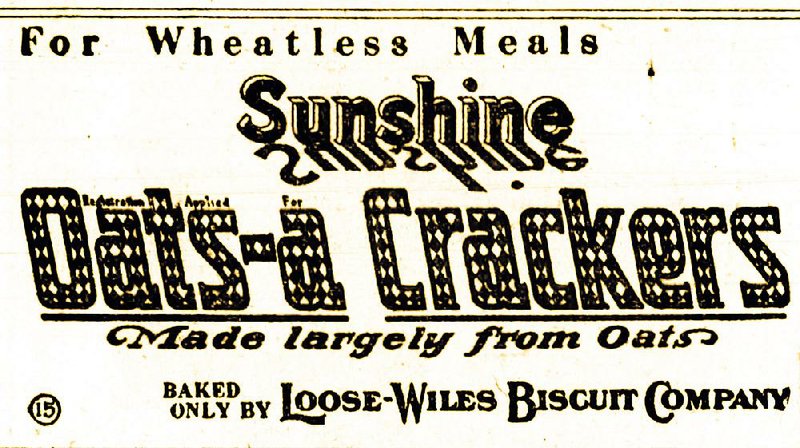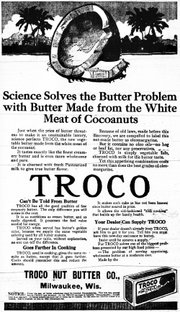An intimidatingly different grocery market opened its doors in Little Rock 100 years ago this week.
Unlike a normal store, in this cutting-edge shopping experience, the brave customer passed through a turnstile into a large rectangular pen of a room divided into four aisles created by rows of display counters.
The aisles flowed together, channeling courageous shoppers through the pen past 1,500 items for sale at prices lower than those in traditional shops.
Display cases were divided into sections, with numbers, and the shelves in each section were classified as top shelf, second shelf, third shelf, fourth shelf, fifth shelf and bottom shelf. Swinging price tags dangled from each shelf so you could see what things cost without asking anyone.
There was no one to ask. Sales clerks were not standing by, waiting to help you (or ignore you or snub you or overcharge you).
The Arkansas Democrat marveled at the layout April 11, 1918:
In each of these sections certain classes of merchandise are to be found, meaning that in one part of the store will be found soap, in another part coffee, in another part will be found cereals, including corn flakes, cream of wheat and other breakfast foods.
You progressed along the aisles at your leisure, deciding whether to buy. No need to ask before picking things up to inspect them. Pick them up, put them down, walk away -- without causing any offense.
Free baskets were provided for use while you were in the store. Simply following the aisles led you back to the front, where there was the settlement, or checkout area with its cash register and sales clerk. The clerk cheerfully totalled your purchases using what the Democrat described as an adding machine, handed you a receipt printed by the machine and took your cash -- no checks accepted, no matter who you were.
Meanwhile, another clerk was sacking your groceries in a paper sack. And then you left, carrying your own groceries, through another turnstile. If you didn't want anything, you put your basket away and walked out through that exit turnstile. Just like that.
Fifty to 100 people could use the shop at the same time!
What it was was Piggly Wiggly.
A new "system" of low-price store, Piggly Wiggly came from Memphis, where one Clarence Saunders, president of the Saunders-Blackburn Co., opened the first one in 1916. (Cliff Blackburn came from eastern Arkansas, and like Saunders was a self-made man.) Within two years, there were Piggly Wigglys in 23 cities.
B.J. Thompson and T.M. Deitz, transplants from Lake Charles, La., introduced the system to the housewives of Little Rock when the doors of the city's first, or "King" Piggly Wiggly at 217 Main St. were thrown open at 10 o'clock April 10. Shoppers were given red carnations.
The next day's Democrat had a photo of a typical store, courtesy of Saunders (the Library of Congress has that image, see it at arkansasonline.com/4918piggly/).
When local citizens entered the Piggly Wiggly store Thursday morning they looked upon a scene identical to that which thousands in other cities were looking upon at the same moment. Piggly Wiggly stores have the same interior everywhere one finds them.
The interior was part of the system, and Saunders had a patent on it, which he later updated; his patent filed as "US1357521" is most like what the Democrat described.
EAT NO WHEAT
One item Piggly Wiggly did not give shoppers unfettered access to was wheat flour. But then, nobody did. Thank you, Great War in Europe.
Wheat for the military was in such short supply the federal Food Administration (aka Herbert Hoover) sought to stabilize the market to keep the troops and allies fed. Only so much could be bought, sold or owned by civilians. First there was the voluntary "wheatless" weekday at restaurants, hotels and bakeries, but then came regulations, including a standard national recipe for "war bread" that mandated set amounts of substitutes such as cornmeal and oats.
It took some thinking to keep up with the regulations, witness this explainer from the April 5 Democrat:
The recent order discontinuing the sale of potatoes by merchants as a flour substitute, does not apply to the use of potatoes in making bread by the bakers, but where potatoes are used for bread making, the present ratio of four pounds of potatoes must be used in place of one pound of other flour substitutes.
When inspectors with law enforcement power began to visit all food-serving, -selling or -storing establishments in Arkansas in April 1918, wheatless Mondays and Tuesdays were universal. Anyone who had stocked up on wheat before the rules changed was given a chance to turn in his excess -- to refund it -- as a patriotic and self-preserving act.
Bottom line: Gluten was unpatriotic in 1918.
The same day Piggly Wiggly opened, a new food item appeared in Little Rock: Troco. Sales rep L.A. Harper came from Milwaukee to explain it, and the Democrat chatted with him.
The new product has been on the market less than a year and in that time the demand has become so great that two new factories had to be built. One of the best endorsements for Troco, according to Mr. Harper, is the fact that the demand for it is greatest in those sections of the country where the most high grade butter is produced and used.
Ah yes, the discriminating butter lovers of the North and the East would know best what might be better than butter.
The label called it oleomargarine, because federal regulations had no category for nut butters. But oleomargarine is extracted from beef fat, and Troco was coconut oil blended into pasteurized dairy milk, colored and flavored to resemble dairy butter.
With milk in short supply (thank you again, Great War), a butter substitute must have intrigued housewives. Troco was distributed by a cold storage company, which will make sense to anyone who knows what happens to coconut oil on a warm day.
Don't take my word for that. Be brave. Try it yourself. As an ad for Piggly Wiggly put it April 11, 1918, bravery isn't only about rescuing a drowning man from angry waves as they undertake to tear to pieces the would-be rescuer and he who cries for help.
Being brave is also being that which recognizes that habit can be broken when that habit is uneconomically sound. ... An uneconomical habit is allowing others to do for one that which a person can best do for himself. A habit such as this breeds laziness, and no lazy man and no lazy woman can be truly alive.
Email:
cstorey@arkansasonline.com
ActiveStyle on 04/09/2018

